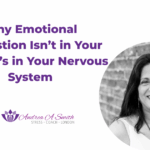In today’s fast-paced world, stress, anxiety, and overthinking have become prevalent issues that can profoundly impact our mental and physical well-being. Fortunately, some professionals, known as stress coach who will specialise in helping individuals effectively manage and reduce their stress levels. In this article, we’ll explore the role of certified life coach and the techniques they employ to assist people in coping with these challenges. Whether you’re struggling with overwhelming stress or seeking ways to improve your overall well-being, a stress coach can be a valuable resource for managing stress.
-
Understanding the Role of a Stress Coach
A stress coach is a dedicated professional (a life coach near me) who works with individuals, especially professionals, to identify the root causes of stress, anxiety, and overthinking. They offer personalised support and guidance throughout the process of stress management. Their expertise lies in understanding the complexities of human emotions and thought patterns, enabling them to create tailored strategies for their clients. Many of us don’t look after our mental health & well-being and stress management helps with work life balance, work related stress and stress management strategies.
-
Techniques Employed by Stress Coaches
2.1 Mindfulness Meditation for Grounding
Mindfulness meditation is a powerful technique that stress coaches often introduce to their clients. This practice involves staying present at the moment and acknowledging thoughts and feelings without judgment. It’s one of the things to do to relieve stress and anxiety. Through mindfulness, individuals can gain better control over their minds and reduce excessive worrying about the past or future. I feel that you think this might be hard to do but just breathing and being in the moment is a start.
2.2 Cognitive Behavioural Therapy (CBT)
CBT is a widely recognised approach a certified life coach uses to challenge and modify negative thought patterns. By reframing their thoughts, individuals can rewire their brains to respond more positively to stress triggers, reducing overall anxiety. This can help dealing with stress, job stress and as a certified stress coach you will have strategies for managing stress in the workplace.
2.3 Stress-Relief Techniques
Stress coaches also teach their clients various stress-relief techniques, such as deep breathing exercises, progressive muscle relaxation, and visualisation. These techniques provide quick relief during moments of heightened stress and anxiety.
2.4 Time Management and Prioritisation
One of the key responsibilities of a stress coach is to help individuals manage their time effectively and prioritise tasks. By establishing a balanced daily routine, clients can reduce the stress associated with time pressures and overwhelming workloads.
2.5 Goal Setting and Action Plans
A life coach can assist you in setting realistic and achievable goals to overcome challenges. Guide you in creating action plans and provide ongoing support to ensure progress is made toward these goals.
-
The Unique Personal Empowerment Strategy
Unlike other stress-relief services, a stress coach empowers individuals to participate in their stress management journey actively. They foster a sense of self-reliance and personal growth, allowing clients to develop long-term coping strategies independently.
-
Importance of Seeking Professional Help
While there are various self-help resources available, the guidance of a stress coach offers personalised attention and expertise that can make a significant difference. They create a safe and non-judgmental space for clients to explore their emotions, providing valuable insights and tools for managing stress.
-
Conclusion
In conclusion, a professional developmental coach is vital in helping individuals manage stress, anxiety, and overthinking effectively. A confidence coach can help work related stress – through mindfulness, cognitive behavioural therapy, stress-relief techniques, time management, and goal setting, stress coaches equip their clients with essential skills to navigate life’s challenges with greater resilience and self-assurance.
I want to say that we don’t see the importance of getting a certified stress coach to help us with mental health and well being – but if you need stress management with a life coach near me then do reach out.
FAQs:
Is reaching out to a life coach near me suitable for everyone?
Stress coaching is beneficial for anyone experiencing stress, anxiety, or overthinking. It can provide valuable support regardless of age, gender, or background. These are confidential and private and your mental wellbeing is important so take a chance and call a life coach.
How long does it take to see results from stress coaching?
The timeline for seeing results may vary depending on individual circumstances and commitment to the coaching process. Some individuals experience improvements early, while others may take weeks or months to notice significant changes.
Can stress coaching be conducted online?
Many stress coaches offer online sessions to accommodate clients’ busy schedules and provide accessibility from the comfort of their homes. But have that discussion and let’s talk wellbeing.
Is stress coaching a substitute for therapy or medical treatment?
While stress coaching can be highly beneficial, it is not a substitute for therapy or medical treatment. If you have severe mental health concerns, it’s essential to consult a qualified mental health professional.
How often should I meet with a certified life coach?
The frequency of coaching sessions depends on individual needs and goals. Some may benefit from weekly sessions, while others may find bi-weekly or monthly meetings sufficient.










